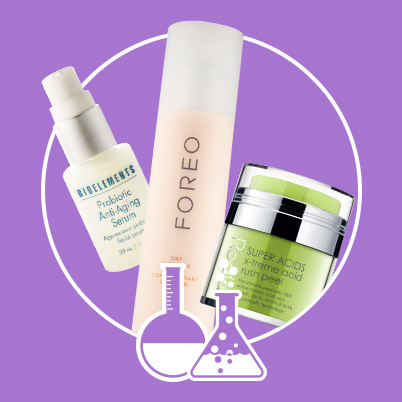You may have heard about the seemingly countless benefits probiotics can provide for everything from your immune system to your digestive tract. Your gynecologist may have even prescribed you a probiotic to help treat an issue you've been dealing with "down there."
For centuries, probiotics, or "good bacteria," have been researched heavily as a cure-all for a slew of health concerns -- gut conditions especially. But only recently have scientists delved into the the idea that these "good" and "bad" bacteria can impact our skin, too.
Several studies have specifically examined the "gut-brain-skin connection" and the benefits of probiotics on skin conditions including acne, eczema, psoriasis and even skin cancer. This makes sense, especially considering the fact that the skin is the body's largest organ. For these reasons and more, people are starting to look to probiotic supplements as a solution for more than their digestive, immune and urinary health problems, but also for clearer, brighter and healthier skin.
But where do you start when it comes to choosing a probiotic supplement that you can put to work for the betterment of your skin-specific conditions? We tapped experts to help us get to the bottom of probiotic supplements and their potential skin benefits.
Image via Getty
For centuries, probiotics, or "good bacteria," have been researched heavily as a cure-all for a slew of health concerns -- gut conditions especially. But only recently have scientists delved into the the idea that these "good" and "bad" bacteria can impact our skin, too.
Several studies have specifically examined the "gut-brain-skin connection" and the benefits of probiotics on skin conditions including acne, eczema, psoriasis and even skin cancer. This makes sense, especially considering the fact that the skin is the body's largest organ. For these reasons and more, people are starting to look to probiotic supplements as a solution for more than their digestive, immune and urinary health problems, but also for clearer, brighter and healthier skin.
But where do you start when it comes to choosing a probiotic supplement that you can put to work for the betterment of your skin-specific conditions? We tapped experts to help us get to the bottom of probiotic supplements and their potential skin benefits.
Image via Getty
Most of us associate the word "bacteria" with slimy, microscopic intruders that are trying to wreak havoc on our bodies. But the reality is not all bacteria are created equal. In fact, there is such a thing as "good bacteria," which we refer to as probiotics, as well as "bad bacteria," which are often referred to as yeast (candida) and parasites.
"These live microorganisms that help make up our microbiome, or world of bacteria that live in and on our body, help prevent bad bacteria from setting up shop," explains Jerome Garden, M.D., the director of the Physicians Laser and Dermatology Institute in Chicago. Now this idea is well-known when it comes to the gut (our intestines have more bacterial cells than human cells). However, this idea of a microbiome with "good" and "bad" bacteria has only recently been expanded to our skin. "Our skin is teeming with bacteria (it is estimated that our skin has approximately one billion microbes per square centimeter), and these bacteria play an important role in our immune system and even skin diseases and aging."
"These live microorganisms that help make up our microbiome, or world of bacteria that live in and on our body, help prevent bad bacteria from setting up shop," explains Jerome Garden, M.D., the director of the Physicians Laser and Dermatology Institute in Chicago. Now this idea is well-known when it comes to the gut (our intestines have more bacterial cells than human cells). However, this idea of a microbiome with "good" and "bad" bacteria has only recently been expanded to our skin. "Our skin is teeming with bacteria (it is estimated that our skin has approximately one billion microbes per square centimeter), and these bacteria play an important role in our immune system and even skin diseases and aging."
Essentially, everything we're exposed to or put into our bodies can impact our bacteria. "Some of the most common offenders in destroying this good bacteria are antibiotics, steroids, processed foods, birth control pills, coffee, carbonated beverages, ascorbic acid, additives and preservatives, radiation, chlorine, fluoride, pesticides, herbicides, fertilizers and stress," explains Sherry Ross, M.D., OB/GYN and women's health expert at Providence Saint John's Health Center in Santa Monica, California.
To put it simply, we will always have an ebb and flow of good and bad bacteria in our systems, which is why it's so important to load up on healthy bacteria to help kill off the unhealthy bacteria. As the gut and skin are intimately related, Garden points out that this microbiome can affect the bacteria that lives on our skin as well.
In an effort to gain more "good gut bacteria," many doctors recommend probiotic supplements. "These supplements work by providing your gut with large amounts of bacteria that are typically found in high numbers in the guts of healthy people," explains Garden. Essentially, by consuming live bacteria, you are providing your intestines with the manpower to crowd out the unhealthy bacteria.
To put it simply, we will always have an ebb and flow of good and bad bacteria in our systems, which is why it's so important to load up on healthy bacteria to help kill off the unhealthy bacteria. As the gut and skin are intimately related, Garden points out that this microbiome can affect the bacteria that lives on our skin as well.
In an effort to gain more "good gut bacteria," many doctors recommend probiotic supplements. "These supplements work by providing your gut with large amounts of bacteria that are typically found in high numbers in the guts of healthy people," explains Garden. Essentially, by consuming live bacteria, you are providing your intestines with the manpower to crowd out the unhealthy bacteria.
So how do our guts influence what's happening on our skin? Recent studies have examined probiotics' impact on specific skin conditions, including acne, psoriasis, rosacea and eczema. "This is a game-changer, as it can appear that your gut flora can moderate what is going on in your skin," says Angela Lamb, M.D., New York City-based dermatologist.
When it comes to the biggest skin offender, acne, studies indicate that taking probiotics in addition to following standard acne treatments can lead to clearer skin. Other research has linked probiotic supplements to a reduction in eczema outbreaks in both adult women and young babies, and a 2008 study showed that patients with rosacea had a greater incidence of having altered gut bacteria flora compared to healthy control patients. "Additionally, there have been some small studies examining oral, and even topical, probiotics showing improvement in mild rosacea," says Dr. Garden.
We may even have probiotics to thank for reducing the appearance of tricky-to-treat sun spots, as probiotic-infused gels are being studied as a way to help chronic ulcers and skin burns. "The theory is that probiotics help normalize the disruptions in the microbiome of the wound, as unhealthy bacteria colonize wounds and inhibit the formation of healthy new skin," Garden explains.
While he admits that these studies are small, they are promising. "As long as patients run it by their doctors first, probiotics, whether as a supplement or increasing it through their diet, can potentially be a beneficial addition to one's skin routine."
When it comes to the biggest skin offender, acne, studies indicate that taking probiotics in addition to following standard acne treatments can lead to clearer skin. Other research has linked probiotic supplements to a reduction in eczema outbreaks in both adult women and young babies, and a 2008 study showed that patients with rosacea had a greater incidence of having altered gut bacteria flora compared to healthy control patients. "Additionally, there have been some small studies examining oral, and even topical, probiotics showing improvement in mild rosacea," says Dr. Garden.
We may even have probiotics to thank for reducing the appearance of tricky-to-treat sun spots, as probiotic-infused gels are being studied as a way to help chronic ulcers and skin burns. "The theory is that probiotics help normalize the disruptions in the microbiome of the wound, as unhealthy bacteria colonize wounds and inhibit the formation of healthy new skin," Garden explains.
While he admits that these studies are small, they are promising. "As long as patients run it by their doctors first, probiotics, whether as a supplement or increasing it through their diet, can potentially be a beneficial addition to one's skin routine."
Even if you're already sold on probiotics' skin benefits, the many, many options in your local health food store may leave you frozen in your tracks.
"Since the effects of individual bacteria strains vary, the first thing to consider when choosing a probiotic supplement is the reason you are taking it," says Rudolph Bedford, M.D., gastroenterologist at Providence Saint John's Health Center in Santa Monica, California. This can help you determine what cause you're trying to treat.
If a pristine complexion is your goal, the most researched probiotic strain that's been linked to skin health is lactobacillus acidophilus. Others to try? Bedford notes that L. Rhamnosus has been known to help eczema and L.Plantarum has been linked to reduction in inflammation, which can also impact the skin.
Since most probiotics in the U.S. are sold as dietary supplements, they do not undergo the same rigorous testing and approval process as other drugs and medications. For this reason, experts urge consumers to be careful when selecting a probiotic supplement.
"Be sure the ingredients are clearly marked on the label and familiar to you or your health provider," says Bedford. It's also important to check expiration dates to make sure the bacteria is live and look for "CFUs," or colony forming units in the billions so you know you're getting an effective amount. "A good brand specifies the amount of live organisms and lists the exact strains used in their formula," he adds.
The label should specify that the living microbes are viable through end of shelf life or "best by" date rather than at time of manufacture to ensure the bacteria are still live when you take them and able to reach your colon. "Quality trumps everything. Supplements that are a bargain are typically not of quality."
"Since the effects of individual bacteria strains vary, the first thing to consider when choosing a probiotic supplement is the reason you are taking it," says Rudolph Bedford, M.D., gastroenterologist at Providence Saint John's Health Center in Santa Monica, California. This can help you determine what cause you're trying to treat.
If a pristine complexion is your goal, the most researched probiotic strain that's been linked to skin health is lactobacillus acidophilus. Others to try? Bedford notes that L. Rhamnosus has been known to help eczema and L.Plantarum has been linked to reduction in inflammation, which can also impact the skin.
Since most probiotics in the U.S. are sold as dietary supplements, they do not undergo the same rigorous testing and approval process as other drugs and medications. For this reason, experts urge consumers to be careful when selecting a probiotic supplement.
"Be sure the ingredients are clearly marked on the label and familiar to you or your health provider," says Bedford. It's also important to check expiration dates to make sure the bacteria is live and look for "CFUs," or colony forming units in the billions so you know you're getting an effective amount. "A good brand specifies the amount of live organisms and lists the exact strains used in their formula," he adds.
The label should specify that the living microbes are viable through end of shelf life or "best by" date rather than at time of manufacture to ensure the bacteria are still live when you take them and able to reach your colon. "Quality trumps everything. Supplements that are a bargain are typically not of quality."





